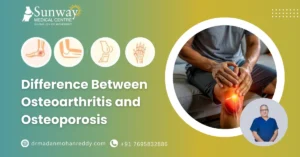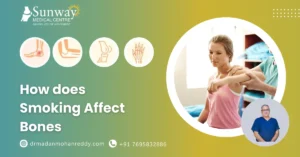Back pain is a widespread condition that impacts millions of individuals across the globe. If you are struggling with back pain, you might be wondering, how to get rid of back pain? Whether it’s a mild ache or a sharp, debilitating pain, finding relief is crucial to regaining your quality of life. As Dr. Madan Mohan Reddy often says, “Understanding the root cause is the first step toward effective treatment.” This article will explore the causes, types, symptoms, and treatments for back pain, offering practical tips to help you feel better.

What is Back Pain?
Back pain refers to discomfort or pain in the spinal region, which may range from the neck to the lower back. It can feel sharp, dull, or burning, and it may come and go or persist for weeks. Understanding what is causing my back pain can be a key step toward recovery. Commonly, back pain is categorized based on its duration:
- Acute Back Pain: Persists from several days up to a few weeks.
- Chronic Back Pain: Lasts longer than three months.
If you’ve been asking yourself how to get rid of back pain, understanding these classifications is the first step.
What does Back Pain Feel Like?
Back pain can manifest in various ways:
- Localized Pain: A specific area of your back feels sore or tender.
- Radiating Pain: Discomfort that spreads into the arms or legs
- Muscle Stiffness: Difficulty in moving due to tightness in your back muscles.
- Shooting Pain: Sharp, electric-like sensations, often linked to nerve issues.
These symptoms can help your healthcare provider with back pain diagnosis and treatment, ensuring a more targeted approach.
Types of Back Pain
Back pain can be classified into different types based on its origin:
- Mechanical Back Pain: Caused by strain or injury to the muscles, ligaments, or joints.
- Radicular Back Pain: Caused by irritation or compression of spinal nerves, leading to symptoms like sciatica.
- Inflammatory Back Pain: Linked to conditions like arthritis or ankylosing spondylitis.
- Lower Back Pain: This is the most common type and can come from sitting too long, lifting incorrectly, or even sleeping in an unsupportive position. If you’re wondering how to get rid of lower back pain, you’re not alone millions deal with it daily.
- Gas Pain in the Upper Back: Trapped gas can sometimes cause surprising discomfort in the upper back or shoulder blades. If you’re bloated or dealing with digestive issues, you may also be asking how to get rid of gas pain in upper back quickly.
- Back Pain During Periods: Hormonal changes and muscle contractions during menstruation can cause dull or intense aches, especially in the lower back. If this sounds familiar, knowing how to get rid of back pain during periods can make each month much easier.
If you’ve been searching for what is causing my back pain, identifying the type is crucial for effective treatment.
What are the Most Common Causes of Back Pain?
If you’re wondering, what is causing my back pain? here are some typical culprits:
- Poor Posture: Maintaining incorrect sitting or standing positions for extended durations.
- Muscle Strain: Overuse or sudden movements leading to strained muscles.
- Herniated Discs: Discs slipping out of place and pressing on nerves.
- Degenerative Conditions: Age-related wear and tear of the spine.
- Injuries: Falls, accidents, or soft injuries.
How can I Find Back Pain Relief?
Finding relief often begins with understanding your pain. If you’re asking, how to get rid of back pain, try these general strategies:
- Rest and avoid activities that worsen the pain.
- Apply hot or cold compresses to reduce inflammation and discomfort.
- Practice gentle stretching or yoga to improve flexibility.
- Take non-prescription pain medications, like ibuprofen or acetaminophen, when necessary.
- Menstrual relief For those wondering how to get rid of back pain during periods, using a warm compress or gentle yoga stretches can relax tension.
- Hydration helps drinking enough water reduces bloating and helps joints stay cushioned particularly helpful for those wondering how to get rid of gas pain in upper back.
10 Ways to Relieve Back Pain
If you’re searching for how to get rid of back pain, try these proven methods:
- Exercise Regularly: Low-impact activities like walking or swimming can strengthen your back muscles.
- Improve Posture: Use ergonomic chairs and maintain a straight spine while sitting.
- Sleep on a Supportive Mattress: A medium-firm mattress provides proper spinal alignment.
- Stay Active: Avoid prolonged bed rest as it can weaken your muscles.
- Stretch Daily: Stretch your hamstrings, lower back, and hips to reduce stiffness.
- Maintain a Healthy Weight: Carrying extra pounds may put added stress on your back.
- Use Heat or Cold Therapy: Alternate between ice packs and heating pads for relief.
- Try Physical Therapy: A therapist can teach exercises to strengthen and stabilize your spine.
- Check Your Posture:Try to sit with your feet flat, shoulders relaxed, and your lower back supported. Even minor adjustments can offer relief if you’re figuring out how to get rid of lower back pain at work.
- Consult a Specialist: Seek help from a professional for back pain diagnosis and treatment if symptoms persist.
Back Pain Diagnosis and Treatment
Accurate back pain diagnosis and treatment is essential for recovery. Here’s what to expect:
- Medical History Review: Your doctor will ask about your symptoms and lifestyle.
- Physical Examination: Tests to evaluate your range of motion and pain triggers.
- Imaging Tests: X-rays, MRIs, or CT scans to identify structural issues.
- Treatment Plan: A combination of therapies tailored to your condition.
If you’ve been asking, how to get rid of back pain, a personalized treatment plan is often the answer.
How to Prevent Back Pain
Prevention is always better than cure. Here’s how you can avoid back pain:
- Exercise Daily: Strengthen core muscles to support your spine.
- Lift Smartly: Bend your knees and keep your back straight when lifting.
- Use Proper Footwear: Wear supportive shoes to reduce back strain.
- Take Frequent Breaks: If you’re sitting for long periods, stand up and stretch every hour.
These measures can help you stop asking, how to get rid of back pain, by addressing it before it starts.
Risk Factors for Back Pain
Certain factors increase the risk of developing back pain:
- Age: Back pain becomes more common with age.
- Obesity: Extra weight strains the spine.
- Sedentary Lifestyle: Lack of physical activity weakens muscles.
- Smoking: Limits blood circulation to the spine and delays the healing process.
Home Remedies for Fast Back Pain Relief
There are several home remedies for fast back pain relief that can provide immediate comfort and reduce inflammation. These remedies can help you manage the pain while you await more advanced treatments, such as physical therapy or medical interventions.
1. Rest and Proper Posture
- Rest: While complete bed rest isn’t recommended for extended periods, short-term rest can help reduce strain on the muscles and ligaments in your back.
- Proper Posture: Avoid slouching, and ensure that your back is properly supported when sitting or standing. Proper posture can help prevent and reduce pain over time.
2. Cold and Heat Therapy
- Cold Therapy: Applying an ice pack to the painful area for 20 minutes at a time can reduce inflammation and numb the pain, especially in cases of acute back pain.
- Heat Therapy: After the initial inflammation subsides, applying a heating pad can help relax muscles and improve blood circulation, aiding in healing.
3. Gentle Stretches and Exercise
- Stretching: Gentle stretches targeting the lower back, hamstrings, and hips can improve flexibility and reduce muscle tension.Try gentle exercises such as the cat-cow stretch or child’s pose.
- Strengthening Exercises: Exercises that strengthen your core and back muscles can help stabilize the spine and prevent future pain episodes.
4. Over-the-Counter Medications
- Nonsteroidal anti-inflammatory drugs (NSAIDs), such as ibuprofen or aspirin, can help reduce pain and swelling. Be sure to follow the dosage instructions carefully.
5. Massage and Acupressure
- Massage Therapy: A professional massage or using a massage tool at home can relieve muscle tightness and reduce discomfort.
- Acupressure: This traditional method can help alleviate pain by applying pressure to certain points on the body that correspond to the pain area.
Conclusion
If you’ve been asking yourself how to get rid of back pain, take action today. Consult a professional like Dr. Madan Mohan Reddy, who specializes in identifying and treating the root causes of back pain. With the right approach, you can regain your mobility and live a pain-free life.
Read More: Back Pain Treatment in Chennai.




